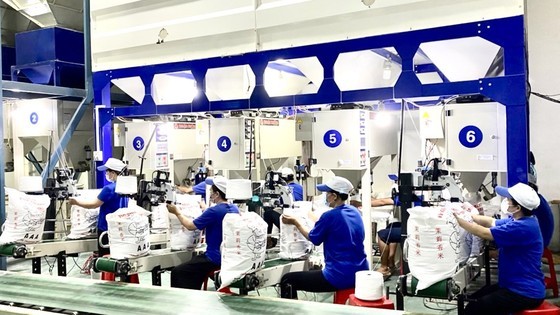 |
Workers are packing rice for export |
Farmers will benefit from lower production costs and the sale of carbon credits, resulting in much higher profits
This year, the country shipped abroad 8 million tons of rice – a record level over the past ten years. To continue to achieve success, in addition to favorable conditions including existing brands, and abundant sources of goods, the Ministry of Industry and Trade noted that rice export businesses need to further tighten their links in the production chain.
At the same time, the country is following green rice farming, also known as aerobic rice cultivation, which is a sustainable and water-efficient method of rice production, improving quality to reach more demanding markets.
According to the Ministry of Agriculture and Rural Development, in the winter-spring crop of 2023-2024, farmers in the Mekong Delta region sowed about 1,475,060 hectares, one percent higher than the sowing area in 2022. It is expected that the winter-spring rice yield in 2023-2024 will reach about 10.7 million tons which is considered a key source of raw materials for export businesses in the first months of 2024.
Currently, the Ministry of Agriculture and Rural Development, localities and a series of businesses in the Mekong Delta region are coordinating closely to achieve high efficiency, especially in the winter-spring crop. Hydrological forecasting agencies continuously update the warnings about water resources meanwhile the agricultural sector in the Mekong Delta closely follows the winter-spring sowing schedule in upstream, middle and coastal areas to avoid drought and salinity at the end of the season.
According to the Vietnam Food Association (VFA), in comparison to the group of major rice exporting countries in the world, Vietnamese rice has the highest price by November 2023. Ms. Tran Thanh Binh, Head of the Import-Export Department under the Ministry of Industry and Trade, said that the average price of Vietnam's rice exports has increased because Vietnamese rice has affirmed its brand. Nearly 200 Vietnamese exporting businesses set Vietnam's rice prices in the market.
However, Ms. Tran Thanh Binh also noted that rice export businesses need to focus on the green production that the world is applying, especially European Union (EU) countries, to have an appropriate business strategy. Therefore, localities in the Mekong Delta and businesses, cooperatives and farmers are pinning their hopes on the project about sustainable development of one million hectares specializing in high-quality, low-emission rice cultivation associated with green growth in the Mekong Delta region.
According to Deputy Minister of Agriculture and Rural Development Tran Thanh Nam, in November 2023, the Ministry of Agriculture and Rural Development will submit this project to the Government for approval. However, Deputy Minister Tran Thanh Nam also asked the Mekong Delta to quickly implement the project of sustainable development of 1 million hectares specializing in high-quality rice cultivation right in the 2023-2024 winter-spring rice crop on an area of 180,000 hectares belonging to the area which was used for the VnSAT project many years ago.
Deputy Minister Tran Thanh Nam stated, sales of carbon credits at the service of farmers will help ensure profits for farmers over 40 percent by 2025 and over 50 percent by 2030. The World Bank has committed to buying carbon credits at US$10 per ton; therefore, one hectare of rice can be sold for about 10 tons of carbon credits, equivalent to $100.
Therefore, building a Vietnamese rice brand to reduce emissions will bring many profits to rice growers. Besides, it is necessary to promote the use of waste and agricultural by-products from rice cultivation to improve the value and economic efficiency of rice production. Deputy Minister Tran Thanh Nam said that this time is more than ever for businesses to join their hands with cooperatives and farmers to create linkage based on investment in raw material areas, harmoniously sharing benefits with farmers.
Despite good signs of rice export, experts in the field have also given many warnings to businesses. According to Mr. Do Ha Nam, Vice President of VFA, the sharp increase in Vietnamese rice prices has led to some cases where businesses lost a lot of money; so they canceled contracts, especially for small businesses with weak financial records while large businesses that have almost finished delivery of goods are forced to buy at high prices to collect enough goods to maintain their reputation with partners. Therefore, he advised that businesses must be very cautious in deciding to sign contracts for distance sales in 2024, because of limited supply and difficult credit capital.
























